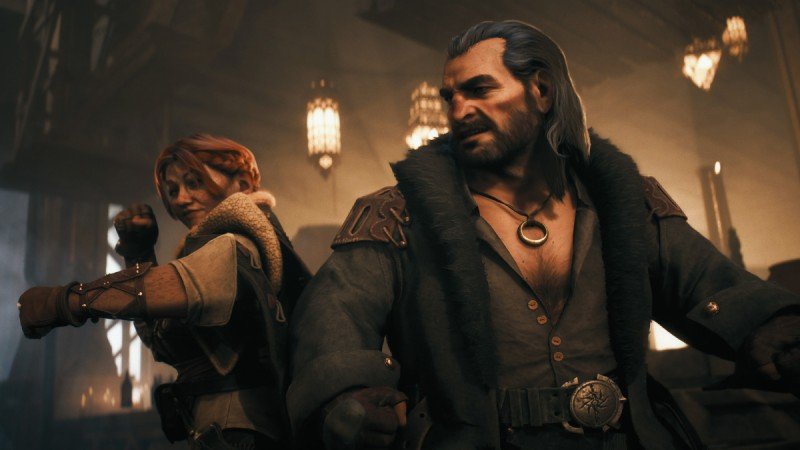Introduction to Veilguard
“Dragon Age: The Veilguard” emerges as the latest addition to BioWare’s storied RPG lineup, promising an immersive experience where romance and relationships are not just side quests, but core elements of the gameplay.
With a rich narrative that allows players to carry over decisions from previous Dragon Age titles, the game offers a personalized journey through the world of Thedas. Players can expect to explore new regions and biomes, some only hinted at in the lore until now.
The character-driven storytelling, combined with a deep combat system that caters to various skill levels, ensures that both newcomers and veterans alike can forge their own path and build meaningful connections with a cast of romanceable companions.
This approach to integrating relationship dynamics into the fabric of the game’s world signifies a bold step in RPG development, aiming to deliver a truly unique and engaging experience.
Dynamic Relationship Levels
In the immersive world of Veilguard, the dynamics between the protagonist, Rook, and their companions are deepened through the innovative Relationship Level system.
This system intricately weaves the player’s choices into the fabric of the game’s narrative and mechanics. Whether it’s through pivotal plot decisions or the seemingly trivial moments of camaraderie, every action has the potential to shape the journey.
As players navigate the rich tapestry of Veilguard’s lore, they’ll find that these relationship levels do more than just add depth to character interactions; they unlock skill points that allow for a more tailored and strategic development of each companion’s abilities.
This feature not only rewards players for engaging with the game’s world and its inhabitants but also ensures that each playthrough can be a unique experience, reflecting the personal style and decisions of the gamer. The Relationship Level system is a testament to the game’s design philosophy, where every choice carries weight, fostering a sense of connection and consequence within the fantastical realm of Veilguard.
Companion Abilities and Synergies
In the intricate world of gaming, the strategic allocation of skill points to a companion’s abilities is not just a matter of combat efficiency but also a reflection of the player’s approach to relationship building within the game.
This dual impact on both personal connections and tactical prowess on the battlefield adds a rich layer of depth to gameplay. Studies have shown that action-oriented games can enhance cognitive skills like attention and executive function, which could translate into more effective decision-making in both game scenarios and real-life situations.
The careful selection of abilities that companions bring into combat can turn the tide of a difficult encounter, making the time invested in developing these virtual relationships and skill sets a rewarding aspect of the gaming experience.
It’s a fascinating intersection of cognitive skill application and the narrative journey, where every choice can open up new possibilities or close off others, mirroring the complexities of real-world interactions and strategies.
Deepening Relationships Through Story and Interaction
The approach that Game Director Corinne Busche is taking with character relationships in the game is quite intriguing. It’s a dynamic system that mirrors the complexities of real-life interactions, where the choices players make can lead to different types of bonds with the characters.
This level of depth in character development not only enriches the storytelling but also adds layers to the gameplay mechanics. It’s fascinating to see how these relationships will unfold and impact the game’s world, potentially altering the player’s journey and even the outcome of the story based on the emotional connections they choose to foster or neglect.
It’s a testament to the evolving nature of video games as a medium for nuanced storytelling and player engagement.
Inclusive Romance Options
The introduction of pansexual companions in Veilguard represents a significant shift in character design and narrative within the game.
By moving away from the “playersexual” approach, where characters’ romantic interests are solely determined by player interactions, the game embraces a more complex and realistic portrayal of relationships.
This change allows for a richer storytelling experience, as companions possess their own distinct preferences and the freedom to form relationships independently of the player’s choices.
Such depth in character development can lead to unexpected and engaging storylines, reflecting the diverse nature of relationships in the real world. It’s a bold move that could set a new standard for inclusivity and representation in gaming.
Early Gameplay Impressions
The dialogue system in RPGs is a fascinating feature that adds depth to the gaming experience.
By offering a spectrum of emotional responses, players can shape their character’s personality and relationships with other characters in the game.
This level of interaction not only enhances the storytelling aspect but also allows for a personalized journey through the game’s narrative.
The mystery surrounding this system likely adds to the anticipation and excitement for players, as they look forward to discovering the various ways their choices impact the game world and its inhabitants. It’s a testament to the evolving complexity of video games as a medium for interactive storytelling and character development.
